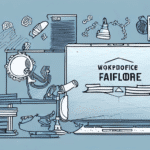Introduction to Scalable Company Culture in Ecommerce
In the rapidly evolving world of ecommerce, cultivating a strong and scalable company culture is essential for sustained success. A cohesive and positive workplace environment not only enhances employee satisfaction and productivity but also drives business growth. As ecommerce businesses experience rapid expansion, the challenge lies in maintaining a culture that evolves in tandem with the company's growth. This article delves into the significance of a robust company culture in ecommerce and offers actionable strategies to build and sustain a culture that scales effectively.
The Importance of a Strong Company Culture in Ecommerce
A robust company culture positively influences every facet of an ecommerce business, from employee morale and retention to customer satisfaction and revenue growth. A healthy, collaborative environment fosters creativity, innovation, and a shared sense of purpose among employees, leading to increased productivity and higher-quality products and services.
Impact on Employee Retention and Morale
According to a Gallup report, companies with strong cultures have 50% higher employee retention rates. A supportive and positive work environment encourages employees to stay longer, reducing recruitment and training costs.
Enhancing Customer Satisfaction and Loyalty
Happy and engaged employees are more likely to deliver excellent customer service, resulting in increased customer satisfaction and loyalty. This can lead to positive word-of-mouth marketing and repeat business, which are crucial for long-term success in the competitive ecommerce landscape.
Driving Innovation and Problem-Solving
A strong culture promotes open communication and collaboration, which are key drivers of innovation. When employees feel valued and empowered, they are more likely to contribute creative solutions and effectively navigate challenges.
Identifying and Defining Company Values
The foundation of a scalable company culture lies in clearly defined company values. These values should reflect the mission and vision of the business and be communicated effectively to all team members.
Establishing Core Values
Identify core values such as integrity, collaboration, innovation, and customer focus. These values should guide company policies and influence how employees interact with each other and with customers.
Promoting Inclusivity and Diversity
Ensure that company values promote inclusivity and diversity. This involves considering the perspectives and experiences of all employees and actively working to create a welcoming environment for everyone.
Regular Assessment and Adaptation
Regularly evaluate the effectiveness of your company values through employee surveys and feedback mechanisms. This ensures that the values remain aligned with the evolving needs and goals of the business.
Hiring for Cultural Fit
Hiring employees who align with your company culture is vital for maintaining a cohesive and productive team. This involves assessing not only technical skills but also personality traits and work styles that complement your company values.
Effective Recruitment Strategies
- Develop interview questions that assess cultural fit and alignment with company values.
- Involve current team members in the hiring process to evaluate potential candidates' compatibility.
- Implement trial periods to assess how new hires integrate with the team and adapt to the company culture.
Industry-Specific Considerations
When hiring for specialized roles, such as marketing in an ecommerce setting, seek candidates with relevant experience in digital marketing and ecommerce platforms to ensure they can contribute effectively to your business goals.
Fostering Communication and Collaboration
Open communication and effective collaboration are pillars of a strong company culture. They build trust, enhance teamwork, and drive collective success.
Implementing Communication Tools
Utilize tools like Slack, Microsoft Teams, or Asana to facilitate seamless communication and project management among team members, especially in remote or hybrid work environments.
Encouraging Feedback and Continuous Improvement
Create a culture where feedback is regularly given and received. This can be achieved through performance reviews, peer evaluations, and open forums for discussion, fostering an environment of continuous learning and development.
Team-Building Initiatives
Organize regular team-building activities and collaborative projects to strengthen relationships and promote a sense of community within the team.
The Role of Leadership in Shaping Company Culture
Leadership plays a critical role in establishing and maintaining a scalable company culture. Leaders must embody the company values and set the standard for behavior and work ethic.
Leading by Example
Leaders should demonstrate the company values in their actions and decisions, serving as role models for employees to follow.
Supporting Employee Growth
Provide opportunities for professional development and growth, which not only enhances employee skills but also reinforces their commitment to the company.
Handling Conflicts and Challenges
Effective leaders address conflicts promptly and fairly, fostering a respectful and harmonious workplace environment.
Balancing Flexibility and Structure
A scalable company culture requires a balance between flexibility and structure. Flexibility can attract and retain top talent, while structure ensures alignment with company goals and values.
Flexible Work Arrangements
Offer remote work options, flexible hours, and other arrangements that accommodate employees' needs, promoting work-life balance and job satisfaction.
Clear Organizational Structure
Maintain a clear organizational hierarchy and defined roles to ensure accountability and alignment with business objectives.
Performance Management
Implement regular performance evaluations and goal-setting practices to provide structure and track progress toward company goals.
Measuring and Maintaining Company Culture Effectiveness
To ensure that your company culture remains effective and scalable, it’s essential to regularly measure its impact and make necessary adjustments.
Utilizing Metrics and Surveys
Conduct employee satisfaction surveys, analyze turnover rates, and monitor key performance indicators (KPIs) related to employee productivity and business performance.
Continuous Improvement
Use the insights gained from measurements to refine and enhance your company culture, ensuring it adapts to the changing needs of your business and workforce.
Benchmarking Against Industry Standards
Compare your company culture metrics with industry standards and best practices to identify areas for improvement and maintain competitiveness.
Maintaining Company Culture in Remote Teams
With the rise of remote work, maintaining a strong company culture across diverse and dispersed teams presents unique challenges but can be effectively managed with the right strategies.
Leveraging Technology for Connection
Use video conferencing, collaboration software, and other digital tools to facilitate communication and maintain connections among remote team members.
Virtual Team-Building Activities
Organize virtual social events and team-building exercises to foster a sense of community and belonging among remote employees.
Regular Check-Ins and Feedback
Implement consistent check-ins and feedback sessions to ensure remote employees feel connected, valued, and aligned with company goals.
Conclusion: Building a Scalable and Positive Company Culture
Creating a scalable and positive company culture is vital for success in the competitive ecommerce landscape. By defining core values, hiring for cultural fit, promoting effective communication and collaboration, balancing flexibility with structure, and continuously measuring and adapting your culture, you can build a workplace environment that supports employee happiness, productivity, and sustainable business growth.




















